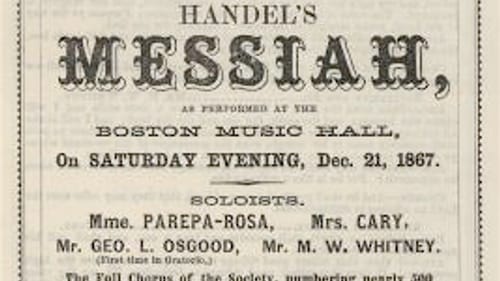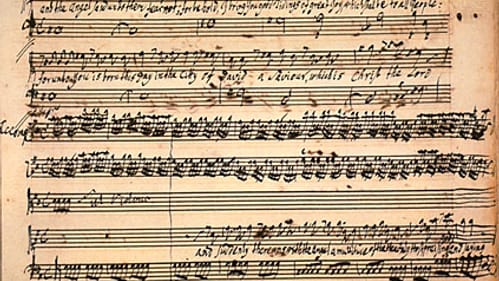Stay in the Loop
BSR publishes on a weekly schedule, with an email newsletter every Wednesday and Thursday morning. There’s no paywall, and subscribing is always free.
Coming up in Philly music: Choosing a ‘Messiah’

Handel’s Messiah is a gift from the 18th-century English culture that gave us some of our best ideas about government and society. You don’t have to be a believing Christian (I’m not) to respond to its basic humanity and the sheer glory of most of the music packed into a work that lasts almost two and a half hours. The "Hallelujah Chorus" is one of the grandest structures any composer ever put together, but it’s just one item in a parade of masterpieces. It’s followed by a final twenty-minute interlude that includes three of Handel’s greatest creations: the bass and trumpet aria “The Trumpet Shall Sound,” the soprano solo “I Know That My Redeemer Liveth,” and the great affirmation in the long, complex final "Amen."
This year Philadelphians can choose between three holiday Messiahs. They all take different approaches to Handel’s masterpiece and they all have different strengths.
Monumental tradition
In the 19th century, audiences favored monumental performances with giant choruses and orchestras. In the 20th century, there was a move toward smaller-scale performances that reproduced the kind of Messiahs presented in Handel’s own day. The Philadelphia Orchestra used to lean toward the Victorian approach, but it’s thinned its forces in recent years. Its greatest strength, of course, is that you’re hearing some of the best orchestral musicians in the world working with soloists with global audiences. This year the soprano solos will be sung by a Baroque specialist, Carolyn Sampson. Male altos were a common feature of many Baroque performances, and the orchestra will reproduce that aspect of 18th-century performance practice with alto solos sung by countertenor Christophe Dumaux. The Symphonic Choir of the Westminster Choir College will provide the all-important chorus.

The Orchestra has often employed a Baroque specialist as a Messiah conductor. This year its own maestro, Yannick Nézet-Séguin, will do the honors. Nézet-Séguin may not be a Baroque specialist, but he’s proved he can handle a wide spread of music, and his enthusiasm and commitment should add some important ingredients to the overall effect.
Monumental conviction
The other two Messiahs will take place in smaller halls and field the kind of forces Handel would have used in his own time — an orchestra of 20 to 40 instruments and a comparable chorus. Both performances will also feature period instruments — the kind of strings and winds actually played in the 18th century.
Vox Ama Deus is a flexible collection of music groups led by Valentin Radu, an enterprising conductor who’s turned his musical conglomerate into a major force in Philadelphia’s musical life. They’ve been presenting a Baroque Messiah for more than 30 years, and Radu is at his best as a conductor, in my opinion, when he’s leading Baroque programs.
One of Radu’s greatest strengths is his conviction. He takes Messiah seriously. He doesn’t regard it as a “Christmas custom” like carol singing and decorated houses. Radu’s approach to Messiah is a little softer and more sensuous than the sturdy English-Protestant style I prefer, but his conviction overrides quibbles based on my personal taste.
The wild card
The wild card in the Messiah competition is the Tempesta di Mare production. Tempesta is a first-class period-instrument orchestra with a national reputation. They've presented Messiah once before, in a rare Easter production in conjunction with the Choral Arts Philadelphia chorus. This year they’ll be working with a church choir and two conductors who are church music directors. Tempesta’s codirectors are experienced, knowledgeable organizers with a great track record, but I’ve never heard the choir or the conductors. I can’t tell you anything about two important elements of the production.

How do you choose?
So which Messiah should you choose? If you would like a large-scale performance supported by a major orchestra, then the Philadelphia Orchestra should give you everything you’re looking for. Their annual performances have been pleasing audiences for decades. If you think you would prefer a Baroque performance that hasn’t been modified to suit modern instruments and a large hall, I can tell you I’ve heard Vox Ama Deus do it and you’ll probably be quite happy with the experience. I can’t offer you a firm opinion on the Tempesta di Mare production, but they usually come up with winners.
I sold my soul to the early-music, period-instrument movement many years ago, so my personal choice will be Vox Ama Deus or Tempesta di Mare. I will probably opt for Tempesta because I want to see how they do. But I could go to both. I live in a vast, pluralistic democracy. I don’t have to limit myself to one Messiah.
The Philadelphia Orchestra will present Handel’s Messiah on Thursday, December 6, at 7:30 pm; on Saturday, December 8, at 8pm, and on Sunday, December 9, at 2pm at the Kimmel’s Verizon Hall (Broad and Spruce Streets, Philadelphia). Tickets ($61-$163) are available online and at the door.
The Vox Ama Deus Ensemble will present Handel’s Messiah on Friday, November 30, at 7pm at St. Paul’s Episcopal Church (22 East Chestnut Hill Avenue in Chestnut Hill); on Sunday, December 2, at 4pm at Paoli’s Daylesford Abbey; on Friday, December 14, at 7pm at St. Mark’s Church (1625 Locust Street, Philadelphia); and on Sunday, December 16, at 4pm at Wayne’s St. Katharine of Siena Church. Tickets ($30; $25 for seniors and $10 for students) are available online and at the door.
Tempesta di Mare will present Handel’s Messiah on Friday, December 7, at 8pm at the Presbyterian Church of Chestnut Hill (8855 Germantown Avenue); on Saturday, December 15, at 8pm at the Philadelphia Episcopal Cathedral (24 S. 38th Street); and on Sunday, December 16, at 3pm at Wilmington’s Christ Church Christiana Hundred. Tickets ($29-$49; $10 for students) are available online and at the door.
Sign up for our newsletter
All of the week's new articles, all in one place. Sign up for the free weekly BSR newsletters, and don't miss a conversation.

 Tom Purdom
Tom Purdom